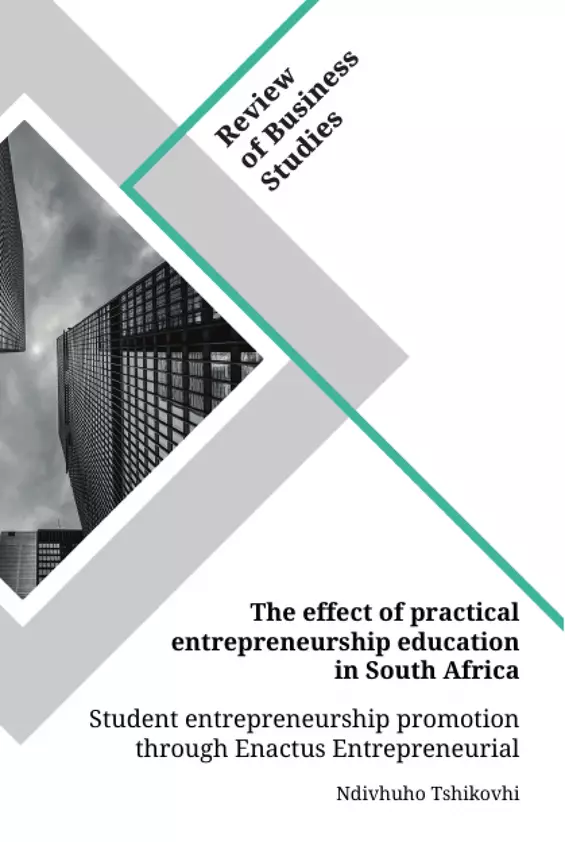This study investigates the effect of practical entrepreneurship education through Enactus entrepreneurial projects. Despite government initiatives such as the National Youth Development Agency (NYDA) and Small Enterprise Development Agency (SEDA) aimed at improving entrepreneurship in South Africa (SA), two phenomena are characteristic: (1) the country is among the least entrepreneurial nations; (2) Unemployed graduates’ lack of interest in entrepreneurship exacerbates high unemployment rates. Consequently, universities are incorporating practical entrepreneurship education into their curricula.
Enactus South Africa, as a typical example of university intervention into the problem, was studied with regard to its effect on student’s entrepreneurship intentions. The thinking is that, without access to jobs, entrepreneurship invariably becomes the alternative. Research into this phenomenon is still limited, and existing literature provides equivocal results.
The study took the form of quantitative research, to enable the researcher to collect data which would answer best the research question in hand. The findings of the study suggest that there is a positive relationship between Enactus entrepreneurial projects and students‟ entrepreneurship intentions. The research design was supportive in constructing the entire framework of the study. The study was descriptive in nature as essentially it aimed to determine the effect of the phenomena on Enactus students.
The population drawn on was Enactus SA, but the sample was taken from the Enactus National Competition 2013, which meant that only students who were representative per Higher Education Institution were sampled. It cannot therefore be assumed that the findings are generalizable to all Enactus SA students.
Inhaltsverzeichnis (Table of Contents)
- CHAPTER 1 INTRODUCTION
- CHAPTER 2 LITERATURE REVIEW
- CHAPTER 3 RESEARCH METHODOLOGY
- CHAPTER 4 DATA ANALYSIS
- …
- CHAPTER 5 RECOMMENDATIONS AND CONCLUSIONS
Zielsetzung und Themenschwerpunkte (Objectives and Key Themes)
This study investigates the impact of practical entrepreneurship education through Enactus entrepreneurial projects on student entrepreneurship intentions. The study aims to address the lack of entrepreneurial activity among South African graduates, particularly in light of high unemployment rates. The study focuses on the potential of Enactus, a university-based organization promoting entrepreneurship, to influence students' career choices and encourage them to pursue entrepreneurial ventures.
- The relationship between Enactus entrepreneurial projects and students' entrepreneurship intentions.
- The effectiveness of practical entrepreneurship education in promoting entrepreneurial activity.
- The role of universities in fostering entrepreneurship among students.
- The potential of Enactus to bridge the gap between academia and the real-world entrepreneurial landscape.
- The influence of gender on students' entrepreneurship intentions within Enactus.
Zusammenfassung der Kapitel (Chapter Summaries)
- CHAPTER 1 INTRODUCTION: This chapter provides a background on entrepreneurship in South Africa and discusses the current challenges faced by unemployed graduates. It introduces Enactus South Africa as a university-based initiative aimed at addressing the problem and outlines the study's objectives and research questions.
- CHAPTER 2 LITERATURE REVIEW: This chapter explores existing literature on entrepreneurship education, Enactus programs, and the factors influencing students' entrepreneurship intentions. It analyzes previous research findings and establishes a theoretical framework for the study.
- CHAPTER 3 RESEARCH METHODOLOGY: This chapter details the research design, data collection methods, and sampling strategy employed in the study. It discusses the quantitative approach adopted and explains the data analysis techniques used to answer the research questions.
- CHAPTER 4 DATA ANALYSIS: This chapter presents and analyzes the collected data, focusing on the relationship between Enactus entrepreneurial projects and students' entrepreneurship intentions. It examines the findings in relation to the study's objectives and theoretical framework, exploring the potential influence of gender on the observed outcomes.
Schlüsselwörter (Keywords)
This study focuses on student entrepreneurship, entrepreneurship education, Enactus, practical entrepreneurship, entrepreneurship intentions, university intervention, and gender differences.
Frequently Asked Questions
What is the effect of Enactus projects on student entrepreneurship?
The study suggests a positive relationship between participating in Enactus entrepreneurial projects and students' intentions to start their own businesses.
Why is entrepreneurship education vital in South Africa?
South Africa faces high unemployment rates among graduates. Practical entrepreneurship education provides an alternative to traditional jobs and fosters economic activity.
What is Enactus?
Enactus is a university-based organization that promotes practical entrepreneurship through community-based projects, bridging the gap between academia and the business world.
What research methodology was used in this study?
The study utilized a quantitative, descriptive research design, collecting data from students at the Enactus National Competition 2013.
Does gender influence entrepreneurial intentions in Enactus?
The study explores the potential influence of gender on entrepreneurial intentions, analyzing whether male or female students respond differently to practical education.
- Citar trabajo
- Ndivhuho Tshikovhi (Autor), 2014, The effect of practical entrepreneurship education in South Africa. Student entrepreneurship promotion through Enactus Entrepreneurial Projects, Múnich, GRIN Verlag, https://www.grin.com/document/540255



